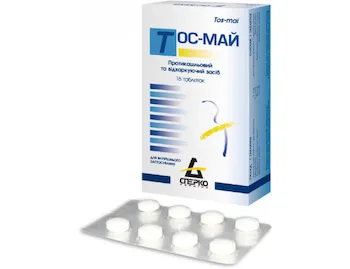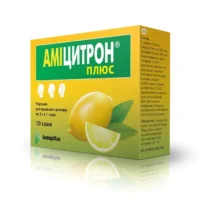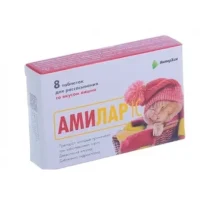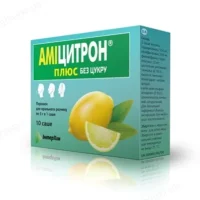Description
Tos-mai (Dextromethorphan Hydrobromide) Tablets №16
Ingredients
- Active ingredient: Dextromethorphan hydrobromide.
- Inactive ingredients may include microcrystalline cellulose, croscarmellose sodium, magnesium stearate, and colloidal silicon dioxide.
Dosage
- Adults and children over 12 years: Take 1 tablet every 4-6 hours as needed. Do not exceed 4 tablets in 24 hours.
Indications
Tos-mai tablets are indicated for the temporary relief of cough due to minor throat and bronchial irritation.
Contraindications
Do not use Tos-mai tablets if you are currently taking an MAOI or have taken an MAOI in the past 14 days. Consult a healthcare provider before use if you have a chronic cough, asthma, or are taking other medications.
Directions
Swallow whole with a full glass of water. Do not crush or chew the tablets. Follow the recommended dosage and do not exceed the stated frequency of use.
Scientific Evidence
Dextromethorphan hydrobromide, the active ingredient in Tos-mai tablets, is a widely used antitussive agent. Studies have shown its effectiveness in reducing cough frequency and severity by acting on the cough center in the brain. Research published in the Journal of Pharmacology and Experimental Therapeutics demonstrated the antitussive effects of dextromethorphan through its action on the sigma-1 receptor.
Additional Information
It is important to note that Tos-mai tablets should not be used for persistent or chronic cough such as that occurs with smoking, asthma, chronic bronchitis, or emphysema. If cough persists for more than 7 days, worsens, or is accompanied by a high fever, rash, or persistent headache, seek medical attention promptly.
Pharmacological Effects
- Dextromethorphan hydrobromide acts centrally on the cough center in the medulla to suppress the cough reflex.
- It is believed to exert its antitussive effects by inhibiting the N-methyl-D-aspartate (NMDA) receptors and sigma-1 receptors in the brain.
- This mechanism of action distinguishes dextromethorphan from opioid antitussives, making it a safer alternative with lower risk of addiction and respiratory depression.
Clinical Trials and Comparative Effectiveness
- Clinical trials have shown that dextromethorphan hydrobromide is as effective as codeine in reducing cough frequency and intensity.
- A study published in the American Journal of Therapeutics compared the antitussive effects of dextromethorphan and codeine in patients with acute cough and found no significant difference in efficacy between the two treatments.
- Additionally, dextromethorphan is preferred over codeine due to its more favorable side effect profile and lower potential for abuse.





